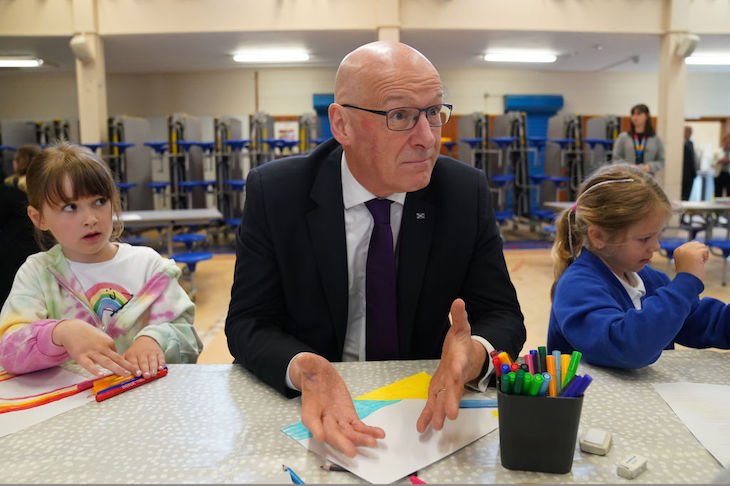The poor are always with us, Jesus said, and that has never been more true than in Scotland over the past 25 years. One in four children is still languishing in poverty, according to the Scottish government’s own statistics. This ratio never seems to change, whoever is in power and however much is spent on it. First Minister John Swinney recommitted himself to the Quixotic objective of eradicating poverty in his programme for government this week. He said ending child poverty will be the ‘single greatest priority’ of his government – just as it was for Humza Yousaf and Nicola Sturgeon and all first ministers since the dawn of devolution. The only certainty is that he will fail – even though the eradication of child poverty has been a legally-binding commitment since 2017.
Campaigners invariably call for ‘taxes on the rich’ to address the problem
Swinney announced that the SNP government is already spending £3 billion on poverty, but that still hasn’t shifted the dial. Much of this money goes on the innovative Scottish Child Payment introduced by Nicola Sturgeon in 2019. A ‘game-changer’ it was called back when the payment, which is over and above the child benefit to which every UK child is eligible, was £10 a week. When the game stubbornly failed to change, the Scottish government increased it to £25 in 2022 and it is set to rise again to £26.70. Yet the chorus of ‘third sector’ voices on Good Morning Scotland insist that this is not nearly enough and are demanding £40 a week. We can be sure, of course, that this will still not be enough.
Anyway, it is simply unaffordable. The Scottish government is in the midst of a financial crisis largely caused by its ambitious social programmes. This week, Finance Secretary, Shona Robison, has had to slash spending by £500 million, even though the Scottish government has just received a record £41 billion block grant award from the UK through the perennially generous Barnett Formula. Swinney has already provoked howls of anguish for shelving plans to extend free school meals to all primary children, and for cutting £200 million from the social housing budget. Inadequate housing is seen as another poverty indicator by campaigners.
Well, the Third Sector had better get used to it, because this is only the start of the belt tightening. The Scottish Fiscal Commission has delivered a long-delayed reality check to all Scotland’s bien pensant politicians, who seem to think benefits are the solution to society’s social ills. Poverty always increases to just above the level that taxpayers can afford.
This is partly because poverty is a flexible concept, defined as it is at 60 per cent of median income. Indeed, a cynical way of reducing poverty would be to provoke a recession. On some measures, relative poverty did actually decline after the financial crash because incomes stagnated. These anomalies abound in poverty politics.
Median household income in Scotland is just under £30,000, according to the Institute for Fiscal Studies. If poverty is 60 per cent of median income, that could place all single pensioner households in dire poverty since the state pension is around £12,000. Any child in a household earning under £18,000 is by definition in poverty, which is why more than half of them are in families where at least one person works. The generous £25 child payment, on top of £25 per week in Child Benefit, should have been enough to fix this, but the poverty goal posts have shifted out of sight in the meantime.
Campaigners invariably call for ‘taxes on the rich’ to address the problem. But the SNP government has been there, done that. Humza Yousaf’s new 45 per cent tax band on earnings over £75,000, plus the increase in the top rate, famously yielded only £82 million, according to the Scottish Fiscal Commission. This was barely enough to fund the Scottish NHS for three days. At a private session of the SNP conference last weekend, John Swinney tacitly admitted that the political limits of progressive taxation had been reached and that the party must win back the middle classes.
The real and lasting solution to child poverty is the one the NGOs never seem to mention: economic growth. More jobs and better incomes is the true magic bullet. Handouts from the state, however necessary and humane in the short term, tend to lock people into poverty rather than releasing them from it. It was a hard lesson learned by Labour governments under Tony Blair. Now the Scottish government has to learn it too.








Comments